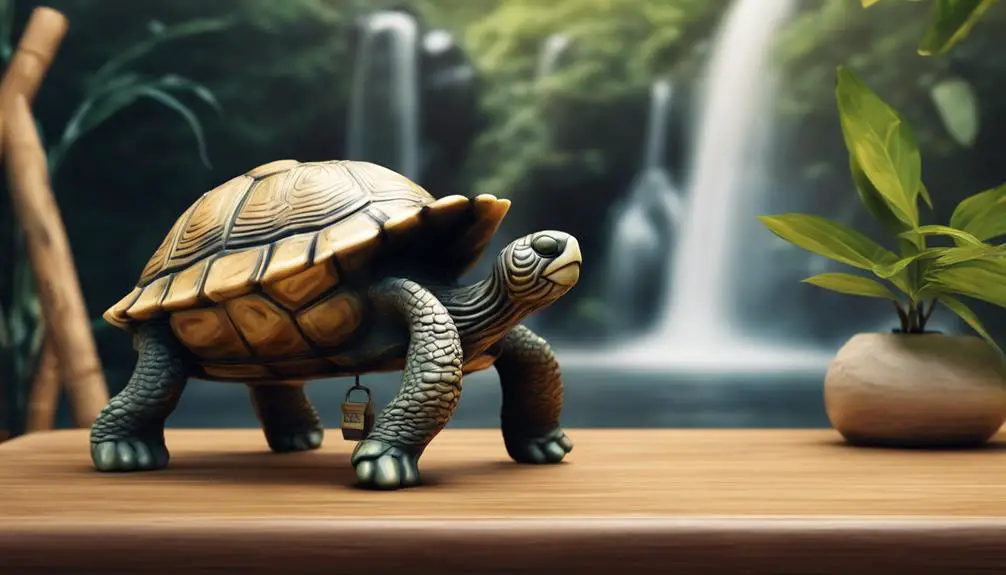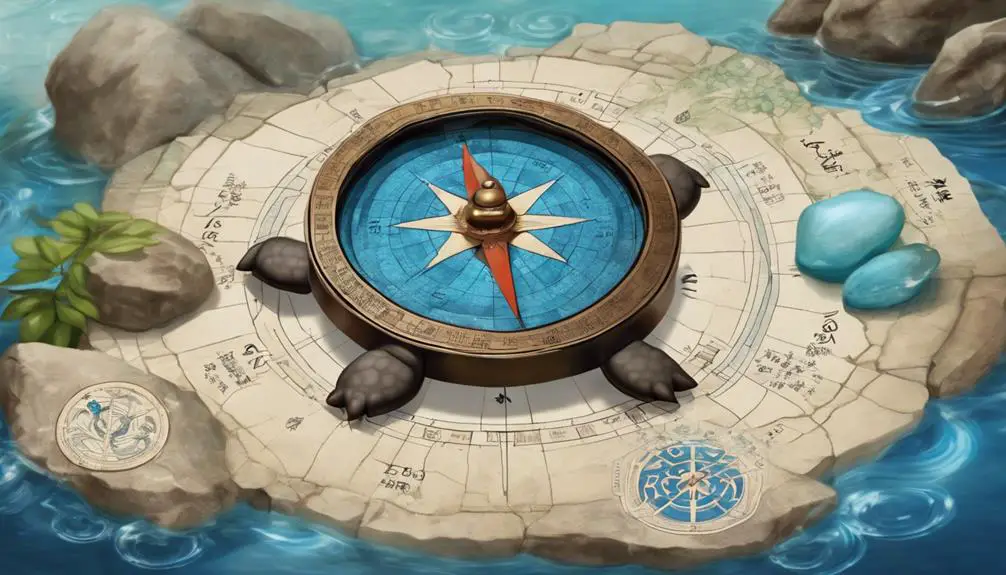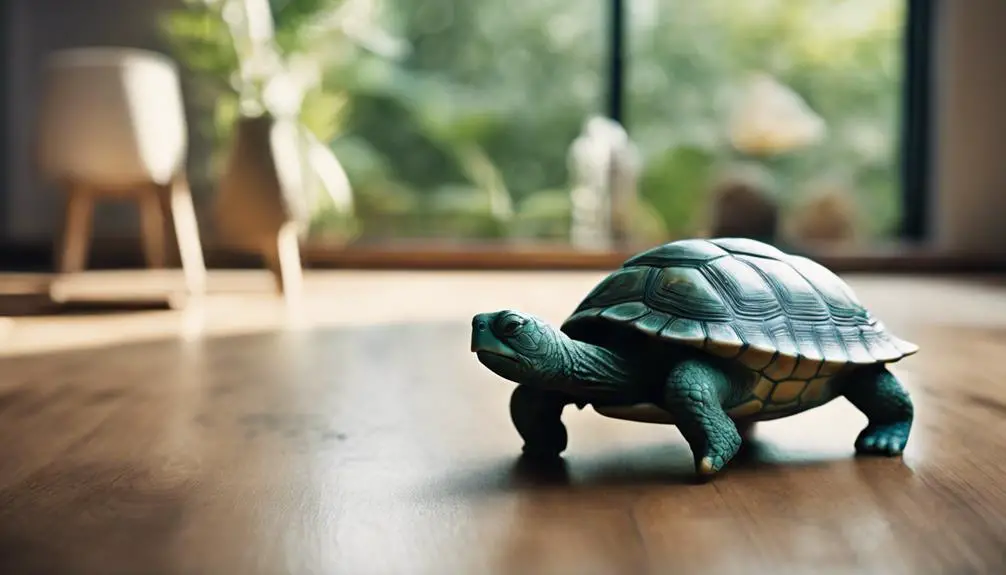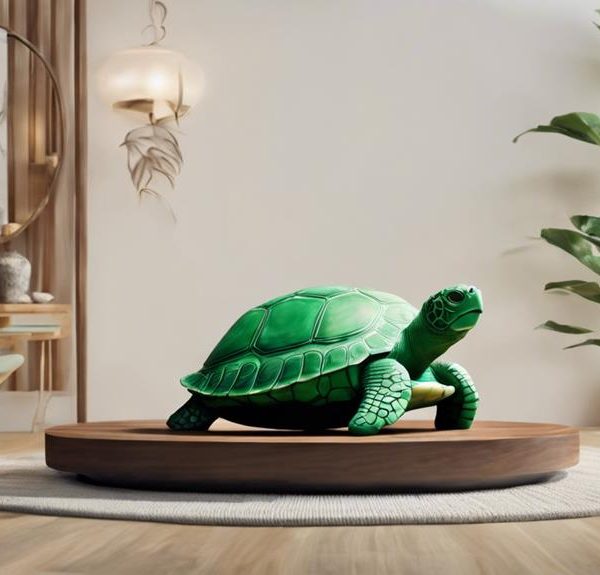Start your journey into Feng Shui turtle placement, a fascinating blend of directions, elements, and personal energies promising harmony and prosperity.

Feng Shui Turtle Placement Direction
Imagine your living room aglow with serene energy, a Feng Shui turtle subtly nestled in a corner. This ancient Chinese practice suggests that the turtle's placement can significantly influence your home's harmony and prosperity.
But where, you might ask, should it face? North, south, east, or west? Well, it's not that simple. There's a whole art behind this, a fascinating mix of cardinal directions, elements, and personal Kua numbers.
It's a journey you'll want to embark on, and once you start, there's no looking back.
Key Takeaways
- The turtle in Feng Shui symbolizes career growth, protection, and longevity, and is associated with the North direction and the Water element.
- Correct placement of a turtle figurine is essential for maintaining energy balance and attracting positive Chi in a space.
- The turtle should ideally face the main door or window and be placed near water bodies, avoiding chaotic areas like the kitchen or bathroom.
- The effectiveness of turtle placement relies on cleanliness, a clutter-free environment, and the choice of a sector that requires stability or protection.
Understanding the Feng Shui Turtle

To fully grasp the importance of the Feng Shui turtle, you need to delve into its rich symbolism and its significant role in this ancient Chinese practice. This creature isn't just any old turtle; it's a revered entity, embodying longevity, stability, and protection. It's one of the four celestial animals in Feng Shui, each representing a significant Feng Shui element and direction.
The turtle, specifically, symbolizes the North and the element Water. It's associated with career growth and personal development, acting as a supportive tool for those seeking advancement in their jobs or personal lives. It's also revered for its protective qualities. The hard shell of the turtle is seen as a powerful shield against negative energy, safeguarding your home or workspace from harmful influences.
In Feng Shui, incorporating the turtle symbol in your home isn't just about placing a random object; it's a mindful practice that requires understanding of its symbolic implications and respectful placement. It's your silent guardian, your symbol of perseverance, and your key to unlocking potential growth. It's more than just a Feng Shui element; it's a testament to the enduring wisdom of this timeless practice.
Basics of Feng Shui Directions

Now that you've grasped the significance of the Feng Shui turtle, let's explore the basics of Feng Shui directions and how they play a crucial role in arranging your space for optimal energy flow. Understanding the Compass School Basics is your first step. This method of Feng Shui uses a compass to determine the precise direction of energy flow.
Each direction in your space corresponds to a different life aspect. North stands for career prospects, South for fame, East for family, and West for children and creativity. You also have Northeast for education, Northwest for helpful people, Southeast for wealth, and Southwest for love and marriage.
The Feng Shui Elements are also vital. Each direction is tied to a specific element: North to Water, South to Fire, East and Southeast to Wood, West and Northwest to Metal, and Southwest and Northeast to Earth. These elements affect the energy in your space, and their balance is critical.
Significance of Turtle Placement

Understanding the significance of turtle placement in Feng Shui can significantly impact your space's energy flow and harmony. The turtle, one of the four celestial animals in Feng Shui, symbolizes protection and stability. It's not just about placing a turtle figurine anywhere; there's a deep-rooted symbolism and set of rituals involved.
Turtle Symbolism is tied to longevity, endurance, and the ability to withstand pressure. It's seen as a shield against negative energy and a promoter of positive Chi. When positioned correctly, it safeguards your home or office, creating an environment of peace and productivity.
Let's discuss Placement Rituals. In Feng Shui, every placement has a purpose. The turtle, typically, should face the rear of your home or office. This placement signifies support, similar to a mountain at your back, providing stability and protection. It's crucial to follow these rituals carefully. An incorrect placement might result in energy imbalance, affecting your wellbeing and success.
Tips for Determining Turtle Position

Determining the optimal position for your Feng Shui turtle involves a few crucial steps you'll want to follow closely. It's not just about placing it anywhere; you should understand the Turtle Symbolism first. In Feng Shui, turtles symbolize longevity, protection, and stability. Keeping this symbolism in mind will guide you in finding the suitable position.
Now, onto Selecting Turtles. It's not necessary to get a real one; Feng Shui allows the use of figurines. Choose one that resonates with you, be it in size, color, or material. Once selected, it's time to find the right spot.
Remember, the back of the turtle should face the main door or window, symbolizing protection against negative energy. If you've got a body of water like a pond or fountain in your home, you can place the turtle near it facing inwards. It's believed that this attracts positive chi and abundance.
Lastly, avoid placing your turtle in chaotic areas like the kitchen or bathroom. The serene energy of the turtle contrasts with the constant activity in these spaces. Stick to calm, quiet places to maximize the turtle's energy. With these tips, you'll be able to position your Feng Shui turtle effectively.
Maximizing Benefits of Turtle Placement

To reap the full benefits from your Feng Shui turtle, you'll need to consider not just its placement, but also the cleanliness and overall environment of the space. Remember, turtle symbolism in Feng Shui is deeply tied to longevity, protection, and stability. Hence, it's essential that the space around it reflects these attributes.
Addressing placement challenges is crucial to maximizing the benefits. A cluttered or dirty space can disrupt the energy flow, diminishing the turtle's effectiveness. So, ensure the area is clean, well-lit, and free from unnecessary items. The turtle should have its own dedicated space where it can serve as a focal point, not hidden or overshadowed by other elements.
Consider the direction of the turtle as well. Traditionally, it's placed facing the main door or the north. However, you may also place it in the sector that corresponds to your life area where you need stability or protection.
Frequently Asked Questions
What Other Feng Shui Symbols Can Be Used in Combination With the Turtle for Enhanced Prosperity?
In Feng Shui, you can pair the turtle symbol with other elements for increased prosperity. Specifically, pairing turtle symbolism with the Feng Shui water element is effective. Water represents wealth in Feng Shui, so when you combine it with the turtle, known for longevity and stability, you're enhancing your fortune greatly.
Other symbols like the dragon for power, or the phoenix for rebirth can also be used with the turtle for a prosperous, balanced environment.
How Often Should I Clean or Maintain My Feng Shui Turtle for Optimal Results?
You should clean your Feng Shui turtle regularly, ideally once a month. Maintaining its cleanliness enhances the turtle symbolism significance.
Don't forget to relocate it regularly too, as constant movement symbolizes steady progress. Keep in mind, the more you care for it, the more positive energy it'll attract.
Can the Feng Shui Turtle Placement Be Used in Outdoor Spaces Like Gardens or Patios?
Absolutely, you can use the Feng Shui turtle in your outdoor spaces like gardens or patios. This enhances the turtle symbolism in Feng Shui, representing stability and protection.
When placing it outdoors, make sure it's facing towards the house for protection. However, don't forget to take care of it. Outdoor turtle positioning requires regular cleaning and maintenance to keep the energy flowing properly.
It's a powerful way to integrate Feng Shui into your outdoor living spaces.
Are There Any Specific Materials That the Feng Shui Turtle Should Be Made of for Best Results?
When considering materials for your Feng Shui turtle, it's vital to note the importance of authenticity. Turtle symbolism is deeply rooted in Feng Shui, and using authentic materials like brass, resin, or crystal can enhance its energy.
However, it's not strictly about the material. Your belief in its power and the respect you show towards it also play a crucial role in harnessing its positive energy. Ultimately, pick what feels right for you.
How Does the Size of the Feng Shui Turtle Affect Its Energy and Influence?
The size of your Feng Shui turtle doesn't significantly alter its energy or influence. Turtle symbolism in Feng Shui is about stability and longevity, not size. What's important is maintaining an energy balance in your space.
Larger turtles might seem more dominant, and could disrupt this balance if not placed correctly. In contrast, smaller turtles are subtle, blending with other elements easily. So, it's not about the turtle's size, but how you use it.
Conclusion
Understanding feng shui turtle placement can greatly enhance your home's positive energy. Keep in mind the basic directions and what each represents. Position your turtle thoughtfully, taking into account its significance.
Use these tips to guide your placement, ensuring your turtle brings prosperity and protection. By maximizing the benefits of its positioning, you're not just placing a decor piece, you're investing in a symbol of longevity and stability.
Harness the power of feng shui and embrace the tranquility it can bring.



Sign up